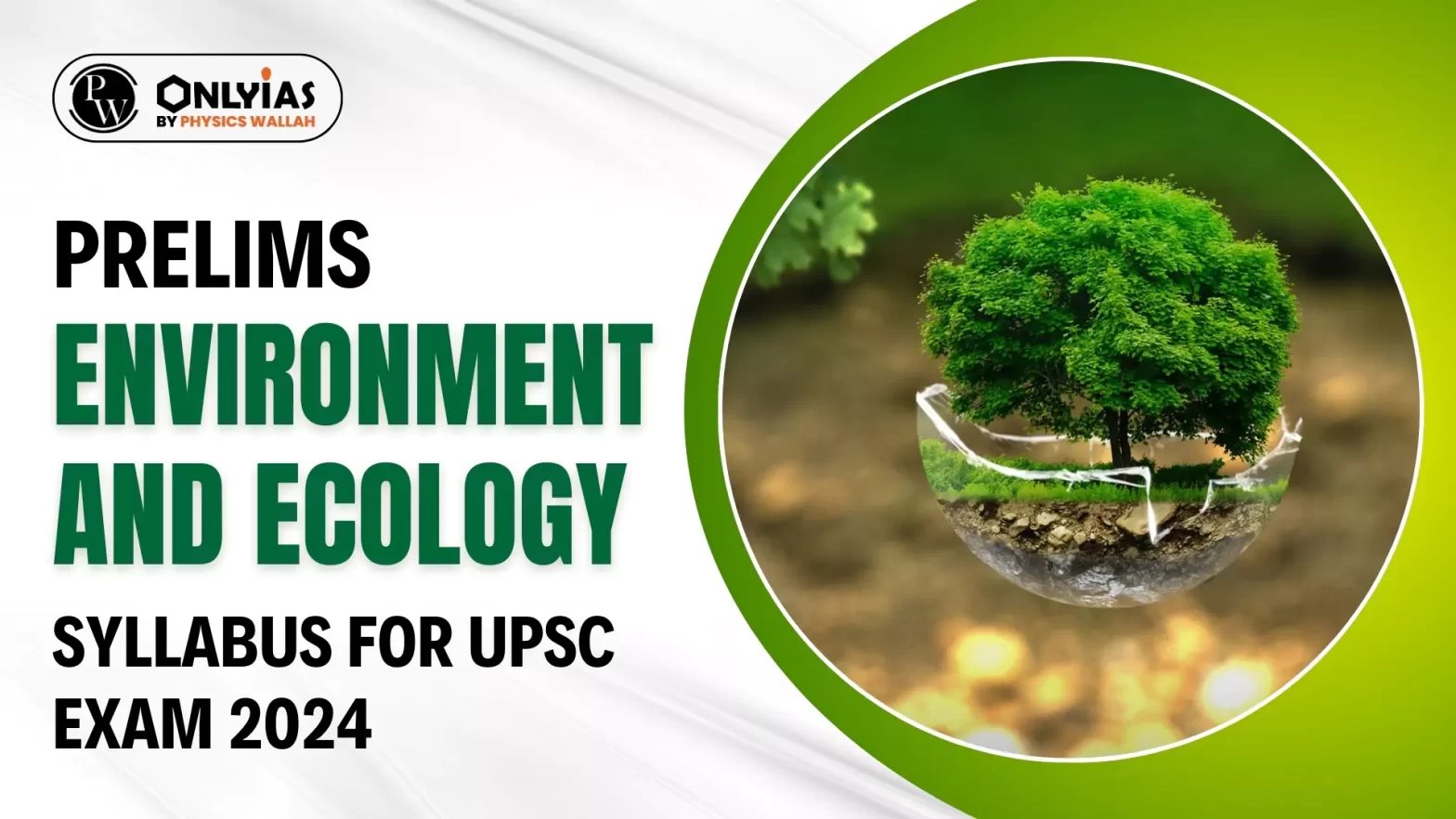Prepare for UPSC Prelims 2024 with a thorough understanding of the Environment and Ecology syllabus. Get insights, strategies, and recommended books.

Prelims Environment and Ecology Syllabus is increasingly becoming dynamic, thus making it unpredictable. A comprehensive detail of the prelims Environment and Ecology syllabus is provided here. Let’s read the article for more details!
The Union Public Service Commission Preliminary Examination, or UPSC Prelims, is the first stage of the Civil Services Examination conducted by the UPSC. The Prelims consist of two papers: General Studies Paper-I and General Studies Paper-II (CSAT), both of which are objective-type multiple-choice exams.
The detailed UPSC Prelims Syllabus is given in the table below:
| General Studies Paper I | General Studies Paper II (CSAT) |
|
|
The UPSC Prelims Environment and Ecology syllabus involves basic understanding of ecological concepts. Candidates must be aware of flora and fauna that are currently trending. In recent times, random questions from animal behavior have been asked. The complete detail of UPSC prelims Environment and Ecology syllabus is as follows:
| Part I: Environment and Ecology | |
| 1. Basic Understanding of Environment and Ecology |
|
| 2. Ecosystems |
|
| 3. Biogeochemical Cycles |
|
| 4. Pollution and Degradation |
|
| 5. Environmental Issues |
|
| 6. Environment Impact Assessment |
|
| 7. Population Ecology |
|
| 8. Waste Management |
|
| Part II: Biodiversity | |
| 1. Basics of Biodiversity |
|
| 2. Indian Biodiversity |
|
| 3.Biodiversity Conservation Initiatives |
|
| 4. Conservation Efforts |
|
| Part III: Climate Change | |
| 1. Basic Understandings |
|
| 2. India and Climate Change |
|
| 3. Climate Change Organizations |
|
| Part IV: Agriculture | |
| Agriculture |
|
| Part V: Miscelleneous | |
| 1. Acts and Policies |
|
| 2. Environmental Organisations |
|
| 3. Environmental Conventions: |
|
| 4. Other Facts |
|
Candidates preparing for prelims have to choose books that completely cover the UPSC prelims Environment and Ecology syllabus. The dynamic aspects have to be covered in newspapers and magazines. The complete booklist for the Environment and Ecology syllabus is given below:
| Book Type | Book Name |
| NCERT |
|
| Reference Books |
|
| Other Sources |
|
In recent years, The UPSC Prelims Environment and Ecology syllabus has gained significant weight. The questions are mainly factual, which requires basic understanding of ecology and environment. The detailed weights of Environment and Ecology questions is given below:
| Year of Preliminary Examination | Number of Environment and Ecology Questions |
| 2023 | 14 |
| 2022 | 19 |
| 2021 | 16 |
| 2020 | 25 |
| 2019 | 20 |
| 2018 | 11 |
| 2017 | 15 |
| 2016 | 12 |
| 2015 | 13 |
| 2014 | 20 |
UPSC expects a candidate to have a basic understanding of all the topics listed in the syllabus. In this regard, a good knowledge of topics that are part of the UPSC Prelims Environment and Ecology syllabus is necessary. Candidates must not ignore current events taking place related to the environment or any species in the news. This news forms the basis on which questions may be framed in the UPSC Prelims Exam.
| Must Read | |
| NCERT Notes For UPSC | UPSC Daily Current Affairs |
| UPSC Blogs | UPSC Daily Editorials |
| Daily Current Affairs Quiz | Daily Main Answer Writing |
| UPSC Mains Previous Year Papers | UPSC Test Series 2024 |
The number of environment and ecology questions asked in UPSC prelims starts at 12 and can go up to 25. This is the reason the subject is very important.
Yes. Many questions are directly related to current affairs topics that have been extensively covered in newspapers such as The Hindu and The Indian Express.
Most of the questions about environment and ecology range from easy to moderate. Sometimes UPSC increases the difficulty of the questions.
No. NCERT books form the basic understanding of the subject. The knowledge base has to be increased by reading the reference books mentioned above.
Magazines such as Down to Earth and Science Reporter must be read for the exam. In addition, PIB, Reports of the Ministry of Environment, UNFCCC, UNEP, etc. are also important.
Yes. It is preferable for candidates to make note of any news topic related to the environment and ecology. In case they cannot manage, they can read any monthly magazine.

<div class="new-fform">
</div>